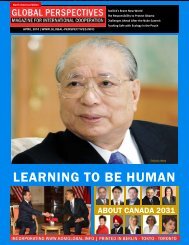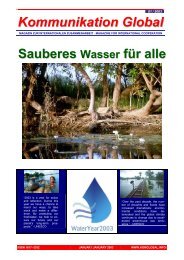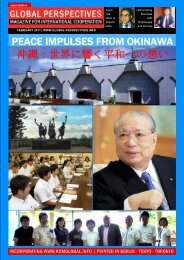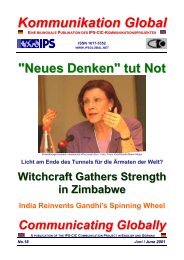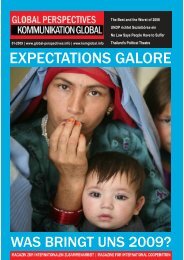GLOBAL PERSPECTIVES | Second Quarterly 2013 â North America ...
GLOBAL PERSPECTIVES | Second Quarterly 2013 â North America ...
GLOBAL PERSPECTIVES | Second Quarterly 2013 â North America ...
Create successful ePaper yourself
Turn your PDF publications into a flip-book with our unique Google optimized e-Paper software.
<strong>GLOBAL</strong> <strong>PERSPECTIVES</strong> - SECOND QUARTERLY <strong>2013</strong><br />
“If the U.S. and Russia can agree to<br />
cut their arsenals in half, for example,<br />
as they did in the 1980s and the<br />
1990s… it would be universally<br />
applauded, and it would be very<br />
difficult for bureaucracies and<br />
political opponents to resist that in<br />
either country,” said Cirincione.<br />
But U.S. progress for disarmament<br />
and non-proliferation has stalled in<br />
the past few years. George Perkovich,<br />
director of the Nuclear Policy<br />
Programme at the Carnegie<br />
Endowment for International Peace,<br />
attributes the U.S.’s balk partly to<br />
internal politics in Washington.<br />
In his April <strong>2013</strong> monograph, Do Unto Others: Toward a<br />
Defensible Nuclear Doctrine, Perkovich writes, “A relatively<br />
small, specialized community of experts and officials<br />
shapes U.S. nuclear policy.”<br />
Members of this community often distort nuclear threats to<br />
the U.S., as well as the best ways to respond to such threats,<br />
argues Perkovich. They do this not in the U.S.’s national<br />
security interest, but in their own career interests to<br />
prevent “their domestic rivals from attacking them as too<br />
weak to hold office”.<br />
Nukes deter U.S.-led regime change<br />
Perkovich also notes in his monograph that Iran, <strong>North</strong><br />
Korea and Pakistan believe having their own nuclear<br />
arsenals deter U.S.-led regime change. They fear the fates of<br />
nuclear-free Iraq in 2003 and Libya in 2011.<br />
Asked how the U.S. should respond if future world<br />
governments – oppressive or not, who are acting against<br />
U.S. interests – continue pursuing nukes to prevent regime<br />
change, Perkovich told IPS that would be a difficult<br />
problem.<br />
“The one and only thing nuclear weapons are good for is to<br />
keep people from invading your country. So, states and<br />
leaders that worry about getting invaded tend to find<br />
nukes attractive, or alliance with the U.S. attractive,” he<br />
said.<br />
“Non-proliferation would be easier to achieve if states<br />
didn’t worry they were going to be invaded and/ or<br />
overthrown if they didn’t have nuclear weapons.<br />
“The problem, clearly, is that some governments are so<br />
brutal and menacing to their own people and neighbours<br />
that it is hard to foreswear trying to remove them,” he<br />
added.<br />
Perkovich recommended that the U.S. limit pressure<br />
against repressive governments to political and moral<br />
means, as well as to sanctions; and that the U.S. clarify it<br />
won’t act militarily, if the repressive regime does not attack<br />
its neighbours or seek nukes.<br />
Cirincione, author of Bomb Scare:<br />
The History and Future of Nuclear<br />
Weapons, argued that vying for<br />
nukes, in Iran and <strong>North</strong> Korea’s<br />
cases, may actually be<br />
counterproductive.<br />
“I don’t think it improves their<br />
security, I think it isolates them even<br />
further,” he said. “It prevents them<br />
from forging the kind of international<br />
ties that can really aid their country,<br />
build their economies (and) increase<br />
their influence.<br />
“That means that in order to stop<br />
those countries from getting or<br />
keeping nuclear weapons, you have to address their<br />
legitimate security concerns. A part of the engagement<br />
with those countries has got to be security assurances that<br />
guarantees then that you won’t attack them, or that their<br />
neighbours won’t attack them.”<br />
Obama’s nuclear legacy<br />
During his December 2012 speech at the National War<br />
College in Washington, U.S. President Barack Obama said,<br />
“Missile by missile, warhead by warhead, shell by shell,<br />
we’re putting a bygone era behind us.”<br />
Cirincione explained that pursuing nuclear disarmament<br />
and non-proliferation has been important to Obama since<br />
his youth. Obama’s first foreign policy speech as president<br />
– in Prague in April 2009 – and his first foreign policy<br />
speech after re-election both focused on nukes.<br />
“The president faces a multitude of pressing issues, but<br />
only two of them threaten destruction on a planetary scale:<br />
global warming and nuclear weapons,” said Cirincione.<br />
While opposition to nuclear disarmament and nonproliferation<br />
is prevalent inside Washington, it pales in<br />
comparison to opposition facing warming, immigration, or<br />
tax reform.<br />
“This is an opportunity for the president to make a major<br />
improvement in U.S. and global security with a relatively<br />
small investment of his time,” said Cirincione, who<br />
explained that Obama’s efforts to curb nukes may conclude<br />
a historic arc, which started with President John F.<br />
Kennedy’s efforts in the 1960s and was accelerated by<br />
President Ronald Reagan’s efforts in the 1980s.<br />
Cirincione said, “(Obama’s) got three and a half years to do<br />
it. If he starts now, he can get the job done. He can change<br />
U.S. nuclear policy to put it irreversibly on a path to fewer<br />
nuclear weapons, and eventually (eliminate) this threat<br />
from the face of the earth.” [IPS | May 17, <strong>2013</strong>] <br />
Image:The first launch of a Trident missile on Jan. 18, 1977<br />
at Cape Canaveral, Florida. Credit: U.S. Air Force<br />
- 31 -




